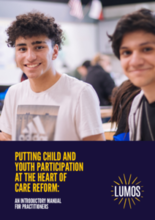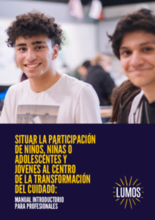Displaying 1581 - 1590 of 14348
This is the first monthly update of the Eastern and Southern Africa Regional Learning Platform published in May 2022.
Putting Children and Young People at the Heart of Care Reform is an introductory manual aimed at practitioners. The manual provides a comprehensive overview of how to meaningfully engage children and young people in care reform. It covers the legal and theoretic framework, the basics in how to engage with children and young people, how to be inclusive and practical ways to engage children and young people in monitoring and evaluation. It also has an extensive chapter on how children and young people can and should be involved throughout care reform, from making decisions about their own care, right up to engaging in global policy decisions. It will challenge readers to increase participation in their own work and equip them with tools to do so in a safe and meaningful way.
You are warmly invited to the launch of an exciting new manual for practitioners on how to engage children and young people throughout care reform. Building on ten years’ experience, this practical manual was designed for practitioners and service managers who want to build their knowledge and skills on meaningful participation. The manual was co-produced by Lumos, Changing the Way We Care and youth-advocates from around the world. At this interactive launch event you will hear from the youth advocates and those who developed the manual on innovative approaches to involving children and young people with lived experience of care systems.
The Haiti Family Care Network will be providing opportunities for collaboration, advocacy, resource sharing and educational forums/training for organizations working with children, youth, families and communities in Haiti.
Black and Latinx youth are more likely to be placed into foster care compared to non-Latinx white youth. Foster care placement can facilitate mental health service use, yet youth from marginalized and oppressed racial and ethnic groups in foster care are still less likely to receive mental health services compared to non-Latinx white youth. This study aims to examine this discrepancy Black and Latinx youth face by testing (a) whether mental health need moderates the relationship between race or ethnicity and foster care placement and (b) whether race or ethnicity moderates the relationship between foster care placement and mental health service use.
Placer les enfants et les jeunes au cœur de la réforme des soins est un manuel d’introduction destiné aux praticiens. Le manuel fournit un aperçu complet de la façon d’impliquer de manière significative les enfants et les jeunes dans la réforme des soins. Il couvre le cadre juridique et théorique, les bases de l’engagement avec les enfants et les jeunes, la manière d’être inclusif et les moyens pratiques d’impliquer les enfants et les jeunes dans le suivi et l’évaluation. Il contient également un chapitre détaillé sur la manière dont les enfants et les jeunes peuvent et doivent être impliqués tout au long de la réforme des soins, depuis la prise de décisions concernant leurs propres soins jusqu’à l’engagement dans des décisions politiques mondiales. Il mettra les lecteurs au défi d’accroître leur participation à leur propre travail et de les doter d’outils pour le faire de manière sûre et significative.
Situar la participación de niños, niñas o adolescentes y jóvenes al centro de la transformación del cuidado es un manual introductorio dirigido a los profesionales. El manual proporciona una visión general completa de cómo involucrar significativamente a los niños y jóvenes en la reforma del cuidado. Cubre el marco legal y teórico, los conceptos básicos sobre cómo interactuar con los niños y los jóvenes; Cómo ser inclusivos y formas prácticas de involucrar a los niños y jóvenes en el monitoreo y la evaluación. También tiene un extenso capítulo sobre cómo los niños y los jóvenes pueden y deben participar en la reforma del cuidado, desde la toma de decisiones sobre su propio cuidado, hasta la participación en decisiones de política global. Desafiará a los lectores a aumentar la participación en su propio trabajo y los proveerá con herramientas para hacerlo de una manera segura y significativa.
Poziționarea Copiilor și a Tinerilor în Centrul Reformei Sistemului de Îngrijire este un manual introductiv destinat practicienilor. Manualul oferă o imagine de ansamblu extensivă asupra modului de implicare semnificativă a copiilor și a tinerilor în reforma sistemului de îngrijire. Acesta acoperă cadrul juridic și teoretic, elementele de bază pentru implicarea copiilor și a tinerii cu experiență trăită în mod incluziv și modalități practice de antrenare a copiilor și a tinerilor în monitorizare și evaluare. De asemenea, are un capitol amplu despre modul în care copiii și tinerii pot și ar trebui să fie implicați pe întreg parcursul reformei sistemului de îngrijire, de la luarea deciziilor cu privire la propria lor îngrijire, până la implicarea în deciziile de politică globală. Manualul va provoca cititorii să sporească implicarea copiilor și a tinerilor cu experiență trăită în munca lor și îi va dota cu instrumentele necesare pentru a realiza această implicare într-un mod sigur și semnificativ.
Childrearing in sub-Saharan Africa is often viewed as collaborative, where children benefit from support from kin. For single mothers living in informal settlements, kin networks may be highly dispersed and offer little day-to-day childrearing support, but may provide opportunities for child fostering. This study conducted in Nairobi, Kenya, uses a linked lives approach, where single mothers’ connections with kin and romantic partners may influence whether – and what type of – kin are relied on to support child fostering.
This article discussed the proceedings for placement of children in foster care by foreign authorities introduced into Polish law. The available official data indicate that the British and German authorities are the most inclined to place children with Polish citizenship in foster care in their homeland.






